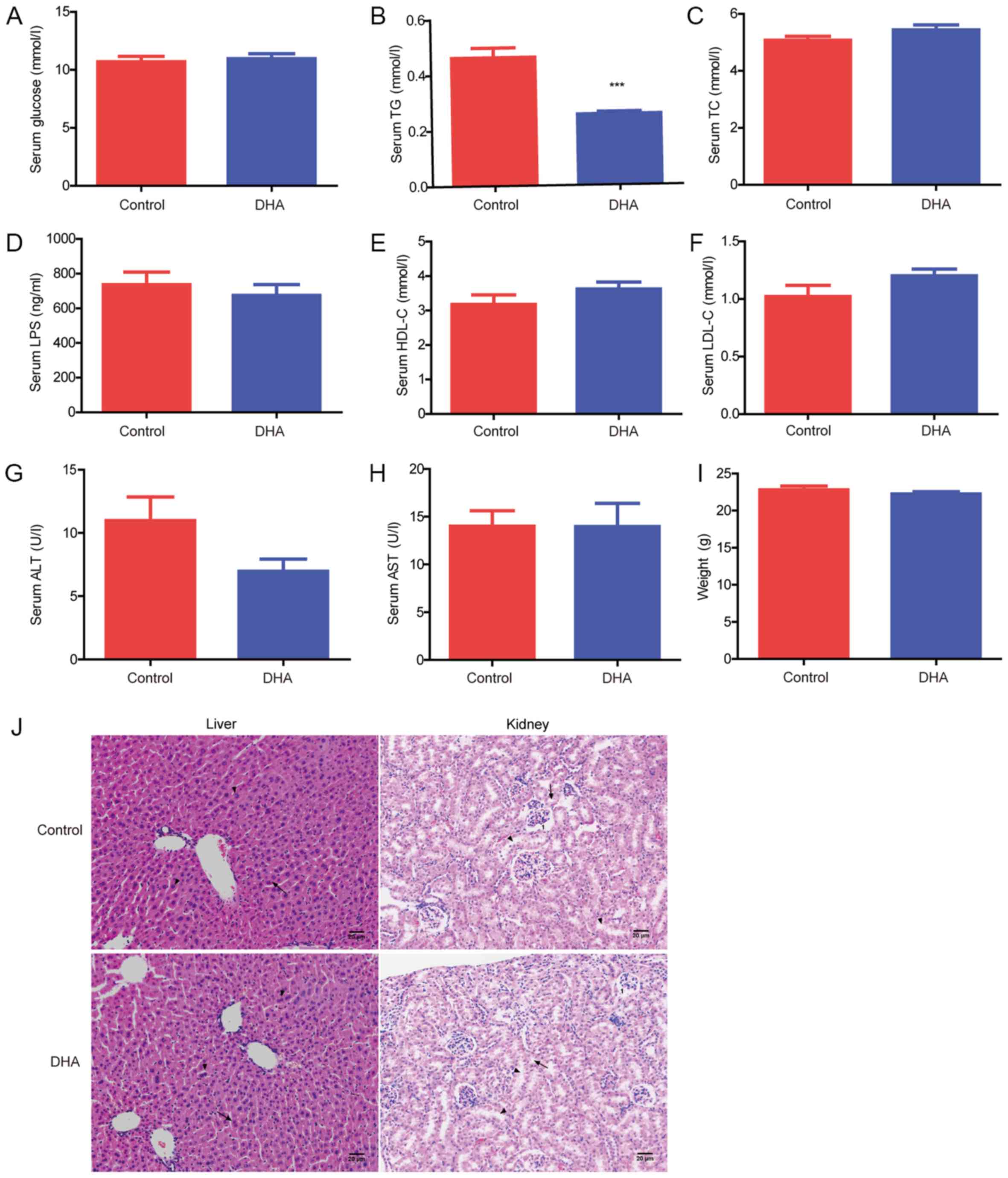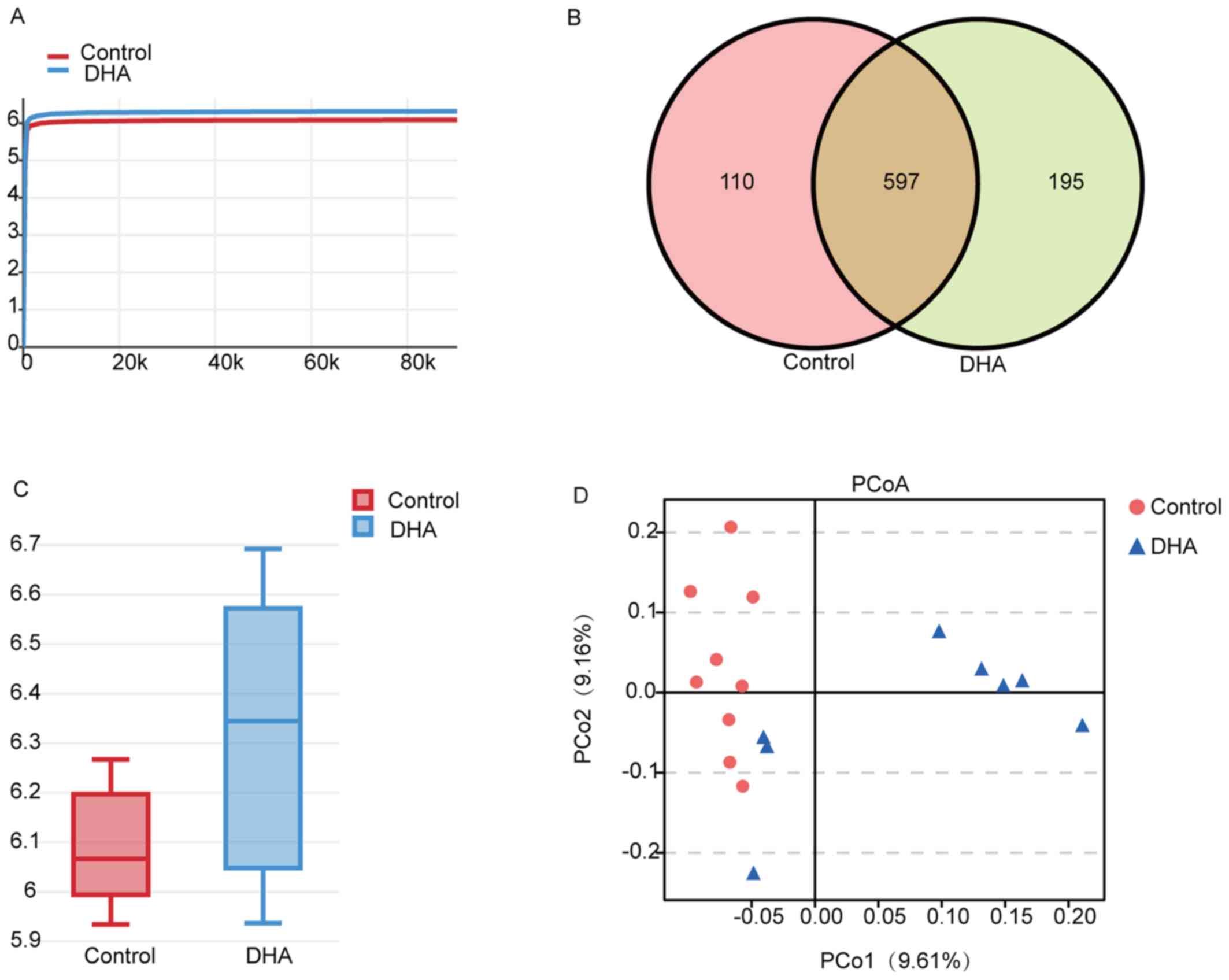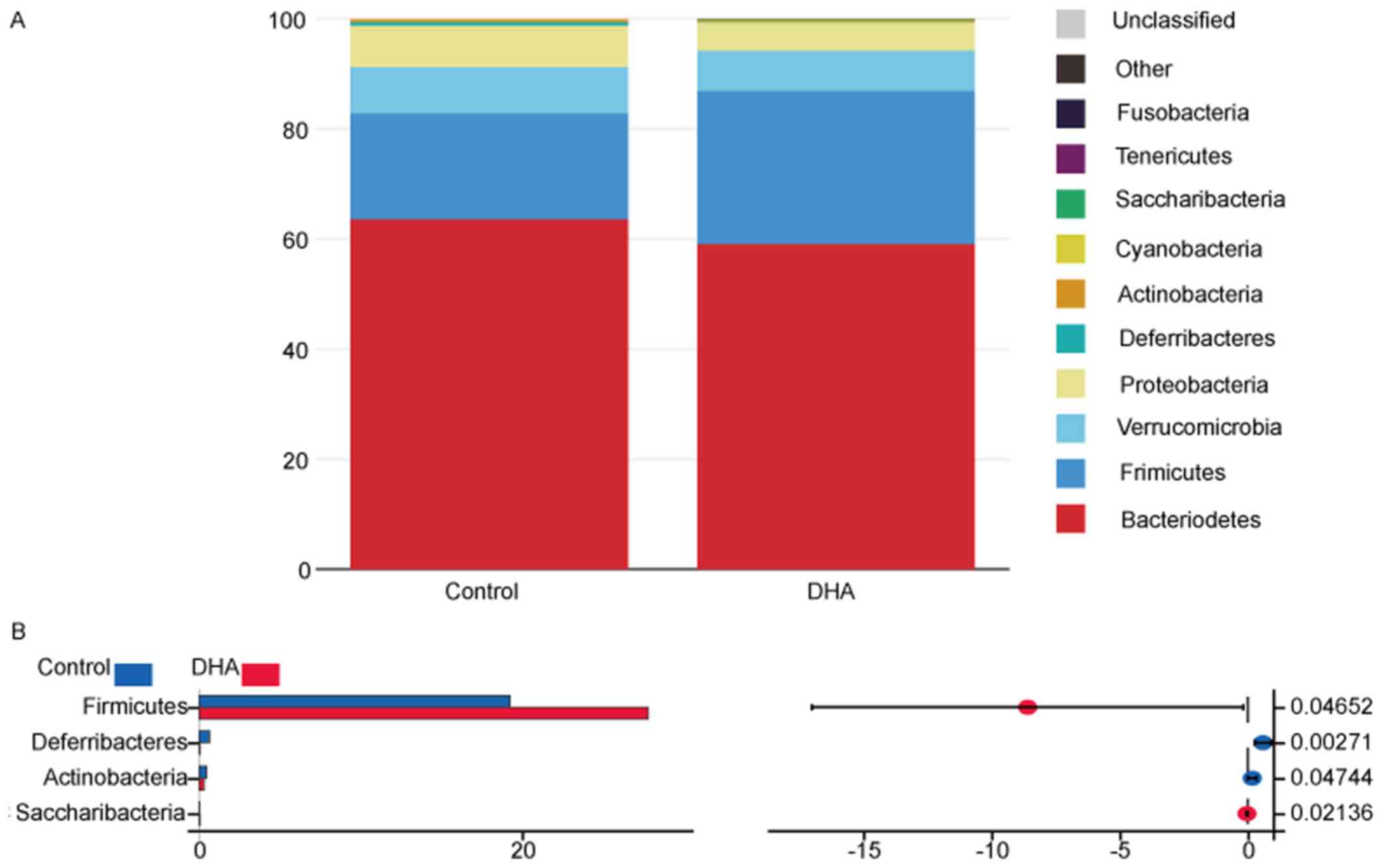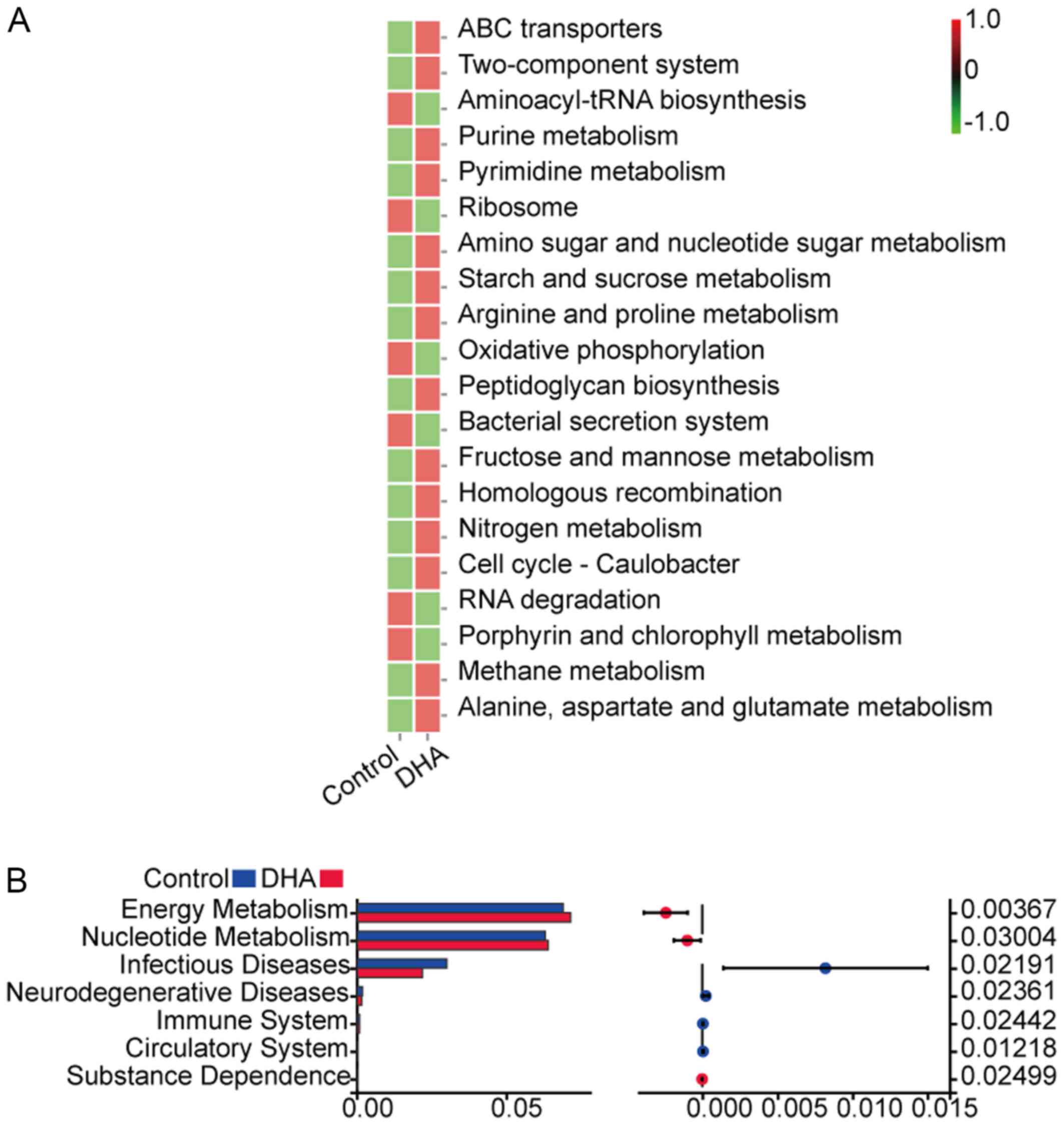|
1
|
Ho WE, Peh HY, Chan TK and Wong WS:
Artemisinins: Pharmacological actions beyond anti-malarial.
Pharmacol Ther. 142:126–139. 2014. View Article : Google Scholar : PubMed/NCBI
|
|
2
|
Liu X, Lu J, Liao Y, Liu S, Chen Y, He R,
Men L, Lu C, Chen Z, Li S, et al: Dihydroartemisinin attenuates
lipopolysaccharide-induced acute kidney injury by inhibiting
inflammation and oxidative stress. Biomed Pharmacother.
117:1090702019. View Article : Google Scholar : PubMed/NCBI
|
|
3
|
Lu F, He XL, Richard C and Cao J: A brief
history of artemisinin: Modes of action and mechanisms of
resistance. Chin J Nat Med. 17:331–336. 2019.PubMed/NCBI
|
|
4
|
Chen X, Bian M, Jin H, Lian N, Shao J,
Zhang F and Zheng S: Dihydroartemisinin attenuates alcoholic fatty
liver through regulation of lipin-1 signaling. IUBMB Life.
71:1740–1750. 2019. View
Article : Google Scholar : PubMed/NCBI
|
|
5
|
Li Y, Zhou X, Liu J, Gao N, Yang R, Wang
Q, Ji J, Ma L and He Q: Dihydroartemisinin inhibits the
tumorigenesis and metastasis of breast cancer via downregulating
CIZ1 expression associated with TGF-β1 signaling. Life Sci.
248:1174542020. View Article : Google Scholar : PubMed/NCBI
|
|
6
|
Yin J, Xia W, Zhang Y, Ding G, Chen L,
Yang G, Huang S, Jia Z and Zhang A: Role of dihydroartemisinin in
regulating prostaglandin E2 synthesis cascade and inflammation in
endothelial cells. Heart Vessels. 33:1411–1422. 2018. View Article : Google Scholar : PubMed/NCBI
|
|
7
|
Zhu H and Ji W: Dihydroartemisinin
ameliorated ovalbumin-induced asthma in mice via regulation of
miR-183C. Med Sci Monit. 25:3804–3814. 2019. View Article : Google Scholar : PubMed/NCBI
|
|
8
|
Schroeder BO and Bäckhed F: Signals from
the gut microbiota to distant organs in physiology and disease. Nat
Med. 22:1079–1089. 2016. View
Article : Google Scholar : PubMed/NCBI
|
|
9
|
Kong CY, Li ZM, Han B, Zhang ZY, Chen HL,
Zhang SL, Xu JQ, Mao YQ, Zhao YP and Wang LS: Diet consisting of
balanced yogurt, fruit and vegetables modifies the gut microbiota
and protects mice against nonalcoholic fatty liver disease. Mol
Nutr Food Res. 63:e19002492019. View Article : Google Scholar : PubMed/NCBI
|
|
10
|
Kareva I: Metabolism and gut microbiota in
cancer immunoediting, CD8/Treg ratios, immune cell homeostasis and
implications for cancer (immuno) therapy: Concise Review. Stem
Cells. 37:1273–1280. 2019. View Article : Google Scholar : PubMed/NCBI
|
|
11
|
Chen YX, Lai LN, Zhang HY, Bi YH, Meng L,
Li XJ, Tian XX, Wang LM, Fan YM, Zhao ZF, et al: Effect of
artesunate supplementation on bacterial translocation and dysbiosis
of gut microbiota in rats with liver cirrhosis. World J
Gastroenterol. 22:2949–2959. 2016. View Article : Google Scholar : PubMed/NCBI
|
|
12
|
Efferth T: From ancient herb to modern
drug: Artemisia annua and artemisinin for cancer therapy. Semin
Cancer Biol. 46:65–83. 2017. View Article : Google Scholar : PubMed/NCBI
|
|
13
|
Olliaro PL, Nair NK, Sathasivam K, Mansor
SM and Navaratnam V: Pharmacokinetics of artesunate after single
oral administration to rats. BMC Pharmacol. 1:122001. View Article : Google Scholar : PubMed/NCBI
|
|
14
|
Dai T, Jiang W, Guo Z, Xie Y and Dai R:
Comparison of in vitro/in vivo blood distribution and
pharmacokinetics of artemisinin, artemether and dihydroartemisinin
in rats. J Pharm Biomed Anal. 162:140–148. 2019. View Article : Google Scholar : PubMed/NCBI
|
|
15
|
Yang Y, Yang F, Huang M, Wu H, Yang C,
Zhang X, Yang L, Chen G, Li S, Wang Q, et al: Fatty liver and
alteration of the gut microbiome induced by diallyl disulfide. Int
J Mol Med. 44:1908–1920. 2019.PubMed/NCBI
|
|
16
|
Yang Y, Lei Z, Huang L, Yang F, Zhang N,
Yuan J, Li K, Chen J and Zhang J: Antitumor ability of berberine
accompanied by modulation of gut microbiome in sarcoma-180
tumor-bearing mice. Int J Pharmacol. 14:460–470. 2018. View Article : Google Scholar
|
|
17
|
Caporaso JG, Kuczynski J, Stombaugh J,
Bittinger K, Bushman FD, Costello EK, Fierer N, Peña AG, Goodrich
JK, Gordon JI, et al: QIIME allows analysis of high-throughput
community sequencing data. Nat Methods. 7:335–336. 2010. View Article : Google Scholar : PubMed/NCBI
|
|
18
|
Valero-Mora PM: ggplot2: Elegant Graphics
for Data Analysis. Journal of Statistical Software. 35:2010.
View Article : Google Scholar : PubMed/NCBI
|
|
19
|
Kemp PF and Aller JY: Bacterial diversity
in aquatic and other environments: What 16S rDNA libraries can tell
us. FEMS Microbiol Ecol. 47:161–177. 2004. View Article : Google Scholar : PubMed/NCBI
|
|
20
|
Frosini BV: Descriptive measures of
ecological diversity. Environmetrics, in Encyclopedia of Life
Support Systems (EOLSS). Jureckova J and El-Shaarawi AH: Eolss
Publishers; Oxoford, UK: 2004
|
|
21
|
Oksanen J, Blanchet FG, Kindt R, Legendre
P, OHara RB, Simpson GL, Solymos P, Stevens MHH and Wagner H:
Vegan: Community Ecology Package. R package. 1:17–12. 2011.
|
|
22
|
Tu Y: Artemisinin-a gift from traditional
Chinese medicine to the world (Nobel Lecture). Angew Chem Int Ed
Engl. 55:10210–10226. 2016. View Article : Google Scholar : PubMed/NCBI
|
|
23
|
Wang J, Xu C, Liao FL, Jiang T, Krishna S
and Tu Y: A Temporizing Solution to “Artemisinin Resistance”. N
Engl J Med. 380:2087–2089. 2019. View Article : Google Scholar : PubMed/NCBI
|
|
24
|
Yuliang W, Zejian W, Hanlin S, Ming Y and
Kexuan T: The hypolipidemic effect of artesunate and ursolic acid
in rats. Pak J Pharm Sci. 28:871–874. 2015.PubMed/NCBI
|
|
25
|
Wang YL, Wang ZJ, Shen HL, Yin M and Tang
KX: Effects of artesunate and ursolic acid on hyperlipidemia and
its complications in rabbit. Eur J Pharm Sci. 50:366–371. 2013.
View Article : Google Scholar : PubMed/NCBI
|
|
26
|
Wolff D, Frese C, Schoilew K, Dalpke A,
Wolff B and Boutin S: Amplicon-based microbiome study highlights
the loss of diversity and the establishment of a set of species in
patients with dentin caries. PLoS One. 14:e02197142019. View Article : Google Scholar : PubMed/NCBI
|
|
27
|
Clarke SF, Murphy EF, OSullivan O, Lucey
AJ, Humphreys M, Hogan A, Hayes P, OReilly M, Jeffery IB,
Wood-Martin R, et al: Exercise and associated dietary extremes
impact on gut microbial diversity. Gut. 63:1913–1920. 2014.
View Article : Google Scholar : PubMed/NCBI
|
|
28
|
Hills RD Jr, Pontefract BA, Mishcon HR,
Black CA, Sutton SC and Theberge CR: Gut microbiome: Profound
implications for diet and disease. Nutrients. 11:E16132019.
View Article : Google Scholar : PubMed/NCBI
|
|
29
|
Wu R, Zhao D, An R, Wang Z, Li Y, Shi B
and Ni Q: Linggui Zhugan Formula improves glucose and lipid levels
and alters gut microbiota in high-fat diet-induced diabetic mice.
Front Physiol. 10:9182019. View Article : Google Scholar : PubMed/NCBI
|
|
30
|
Song B, Zhong YZ, Zheng CB, Li FN, Duan YH
and Deng JP: Propionate alleviates high-fat diet-induced lipid
dysmetabolism by modulating gut microbiota in mice. J Appl
Microbiol. 127:1546–1555. 2019. View Article : Google Scholar : PubMed/NCBI
|
|
31
|
Mazloom K, Siddiqi I and Covasa M:
Probiotics: How effective are they in the fight against obesity?
Nutrients. 11:E2582019. View Article : Google Scholar : PubMed/NCBI
|
|
32
|
Kim SK, Choe JY and Park KY:
Anti-inflammatory effect of artemisinin on uric acid-induced NLRP3
inflammasome activation through blocking interaction between NLRP3
and NEK7. Biochem Biophys Res Commun. 517:338–345. 2019. View Article : Google Scholar : PubMed/NCBI
|
|
33
|
Jiang Y, Du H, Liu X, Fu X, Li X and Cao
Q: Artemisinin alleviates atherosclerotic lesion by reducing
macrophage inflammation via regulation of AMPK/NF-κB/NLRP3
inflammasomes pathway. J Drug Target. 16:1–10. 2019.
|
|
34
|
Lu BW, Baum L, So KF, Chiu K and Xie LK:
More than anti-malarial agents: Therapeutic potential of
artemisinins in neurodegeneration. Neural Regen Res. 14:1494–1498.
2019. View Article : Google Scholar : PubMed/NCBI
|


















